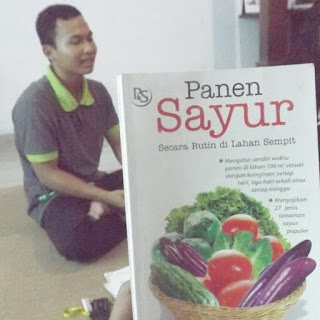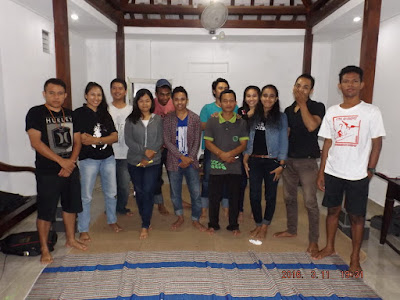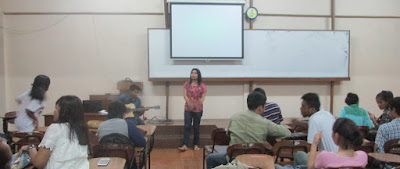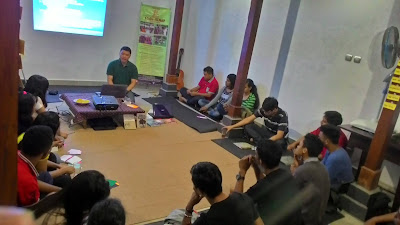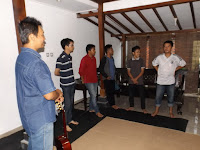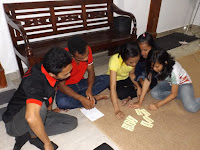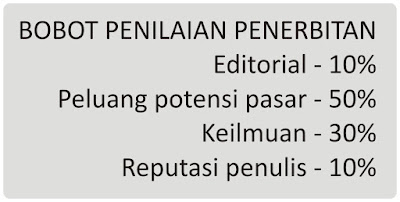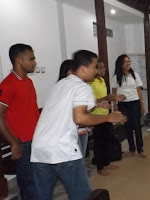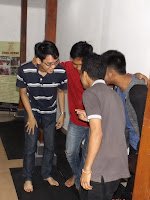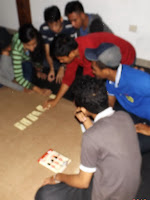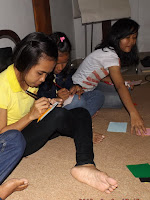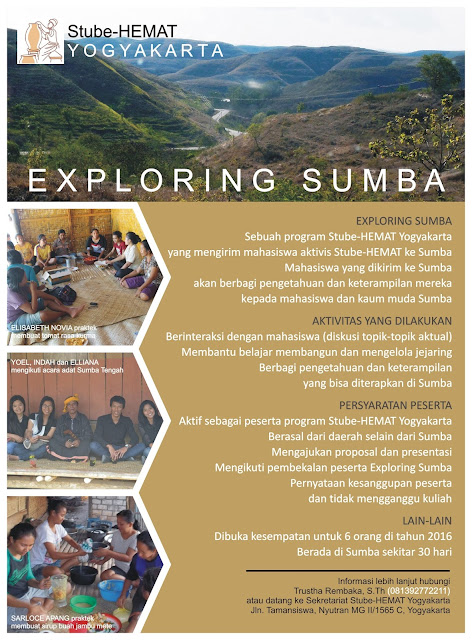Tuesday, 29 March 2016
by adminstube
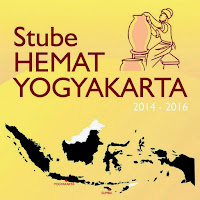 A topic on social justice discussing ‘Drought in Jogja’ became a hot topic among participants who have ever attended Stube-HEMAT training on Christianity and Social Justice. This group was called Enviro 16, consisting of 6 students from Institut Teknologi Yogyakarta (ITY): Timotius, Olive, Cindy, Lili, Martina and Mendo, plus Agus, Eman and Peter, also the representatives of Stube-HEMAT, Yohanes and Stenly.
A topic on social justice discussing ‘Drought in Jogja’ became a hot topic among participants who have ever attended Stube-HEMAT training on Christianity and Social Justice. This group was called Enviro 16, consisting of 6 students from Institut Teknologi Yogyakarta (ITY): Timotius, Olive, Cindy, Lili, Martina and Mendo, plus Agus, Eman and Peter, also the representatives of Stube-HEMAT, Yohanes and Stenly.
by adminstube
'Drought' in Jogja
Development, Environmental Issues
and Our Response
'Drought in Jogja' is not just an expression in cyber world but it is real in daily world. Mural art as a symbol of creativity of street artists also described this phenomenon. 'Drought in Jogja' contained a message and warning that people living in Yogyakarta must be alert that their surrounding in a threat of water shortage.
 A topic on social justice discussing ‘Drought in Jogja’ became a hot topic among participants who have ever attended Stube-HEMAT training on Christianity and Social Justice. This group was called Enviro 16, consisting of 6 students from Institut Teknologi Yogyakarta (ITY): Timotius, Olive, Cindy, Lili, Martina and Mendo, plus Agus, Eman and Peter, also the representatives of Stube-HEMAT, Yohanes and Stenly.
A topic on social justice discussing ‘Drought in Jogja’ became a hot topic among participants who have ever attended Stube-HEMAT training on Christianity and Social Justice. This group was called Enviro 16, consisting of 6 students from Institut Teknologi Yogyakarta (ITY): Timotius, Olive, Cindy, Lili, Martina and Mendo, plus Agus, Eman and Peter, also the representatives of Stube-HEMAT, Yohanes and Stenly.
On Monday, March 28, 2016, in the secretariat of Christian Student Fellowship (PMK) ITY, they discussed introduction of actual issues concerning development and its effects toward environment in Yogyakarta. Yohanes shared a story about Yogyakarta in the past, where many people loved walking on the pavement, shady trees along the road side; people cycling joyfully passing by; while youngsters got chances to find lovers in Yogyakarta. But now, everything has changed. The development spread to edge of the city. Physical and non-physical development expanded to encounter population growth. The construction of large buildings leaped over the development of human dignity. Many large buildings, especially hotels and malls have exploited the groundwater which trigger dryness of people’s wells. Many people faced difficulty in obtaining water. Yogyakarta is getting dry. Development brings positive and negative impacts. People get the benefit but also feeling anxiety. People are worried about the decreasing of environmental quality. People prosecute fair development, pro to environment.
The discussion participants were students of environmental study, they should be familiar with the issues. But, this assumption was not absolutely correct, because they learn development and its effects and focus on the scale of national issues such as mining, agriculture, and industry. So, local issues in Yogyakarta were not be learned in their study even though it is interesting and important.
Agus, one of the participants, commented on the development of infrastructure in the rural regions. "The construction of factories influenced economic life, culture and environment in the region. In economical aspect, development increases revenue and cash flow to the area. It means benefits for economic growth. In cultural aspect, industrial growth affects society lifestyle, pushes to higher consumption while the spirit of saving money is no longer interesting. In the environmental aspect, the development is profitable but it needs correction and improvement. Because some companies meet the criteria of EIA (Environmental Impact Assessment), and some others do not, so pollution and environmental damage still happened.” Agus referred to mining companies, tourism, agriculture and public infrastructure.
This group wishes that more and more friends who are aware of the environment changing, be wiser in managing it and eager to share understanding of love to environment to many people, so they become aware that the environment is important to be maintained. Keeping environment means maintaining righteous life. (YDA).
Monday, 14 March 2016
by adminstube
 The comics were used as teaching materials for small children in Sunday school of 5-8 years at Javanese Christian Church of Ambarukmo, Pepanthan Nologaten, on Monday, March 13, 2016, with the theme "Pay at any price" (Yoh.12: 1-8). The figures taken from the Bible was Judas, who kept injustice since in his mind. Judas abused his position as treasurer of the community of Jesus' followers. The feeling of envy grabbed him when Mary Magdalene anointed Jesus' feet with narwastu oil, cost 300 dinars, or about $ 10,000. He denounced it as a wasting thing, he launched criticism as if he was caring orphans. Mary did it as her expression of gratitude for the miracles onto Lazarus, which arised from his dead. She thought that his life is more precious than money.
The comics were used as teaching materials for small children in Sunday school of 5-8 years at Javanese Christian Church of Ambarukmo, Pepanthan Nologaten, on Monday, March 13, 2016, with the theme "Pay at any price" (Yoh.12: 1-8). The figures taken from the Bible was Judas, who kept injustice since in his mind. Judas abused his position as treasurer of the community of Jesus' followers. The feeling of envy grabbed him when Mary Magdalene anointed Jesus' feet with narwastu oil, cost 300 dinars, or about $ 10,000. He denounced it as a wasting thing, he launched criticism as if he was caring orphans. Mary did it as her expression of gratitude for the miracles onto Lazarus, which arised from his dead. She thought that his life is more precious than money.

 Domi said, "Those children are enthusiastic to draw, they are motivated to master the material as illustrated in pictures. Even simple, I believe this experience will stay imprinted in their hearts, so injustice in their mind will be gradually vanished." Jerry looked so proud because the children appreciated his work. He is now working a Bible comic using Sumba language because of his longing to share experiences to children in his hometown. The comic tells about justice done by figures in the bible.
Domi said, "Those children are enthusiastic to draw, they are motivated to master the material as illustrated in pictures. Even simple, I believe this experience will stay imprinted in their hearts, so injustice in their mind will be gradually vanished." Jerry looked so proud because the children appreciated his work. He is now working a Bible comic using Sumba language because of his longing to share experiences to children in his hometown. The comic tells about justice done by figures in the bible.
by adminstube
Trimming Injustice
Since Children
Teaching about social justice is not an easy thing, especially for children. But Domi (a theology student of STAK Marturia) and Jerry (an agriculture student of Tamansiswa University) tried to solve this problem. Their collaboration made everything easy and attractive, because Domi is talented in teaching while Jerry is great to move pencil into comic strips. Both optimized their talent to create a teaching material on social justice based on Bible characters. "By teaching this material to children since earlier will strengthen their basic sense of justice," they said.
 The comics were used as teaching materials for small children in Sunday school of 5-8 years at Javanese Christian Church of Ambarukmo, Pepanthan Nologaten, on Monday, March 13, 2016, with the theme "Pay at any price" (Yoh.12: 1-8). The figures taken from the Bible was Judas, who kept injustice since in his mind. Judas abused his position as treasurer of the community of Jesus' followers. The feeling of envy grabbed him when Mary Magdalene anointed Jesus' feet with narwastu oil, cost 300 dinars, or about $ 10,000. He denounced it as a wasting thing, he launched criticism as if he was caring orphans. Mary did it as her expression of gratitude for the miracles onto Lazarus, which arised from his dead. She thought that his life is more precious than money.
The comics were used as teaching materials for small children in Sunday school of 5-8 years at Javanese Christian Church of Ambarukmo, Pepanthan Nologaten, on Monday, March 13, 2016, with the theme "Pay at any price" (Yoh.12: 1-8). The figures taken from the Bible was Judas, who kept injustice since in his mind. Judas abused his position as treasurer of the community of Jesus' followers. The feeling of envy grabbed him when Mary Magdalene anointed Jesus' feet with narwastu oil, cost 300 dinars, or about $ 10,000. He denounced it as a wasting thing, he launched criticism as if he was caring orphans. Mary did it as her expression of gratitude for the miracles onto Lazarus, which arised from his dead. She thought that his life is more precious than money.
It was hard to explain such topic to children, but Domi and Jerry combined the bible story and pictures. They involved children to colour the picture of the story. Some children nodded their head while colouring, some other having conversation with Domi:
"Who cheated?" Domi asked.
They spontaneous answered, "Judas!”
So, such action could not be....?" Domi asked again.
"...followed!” they shouted together.

 Domi said, "Those children are enthusiastic to draw, they are motivated to master the material as illustrated in pictures. Even simple, I believe this experience will stay imprinted in their hearts, so injustice in their mind will be gradually vanished." Jerry looked so proud because the children appreciated his work. He is now working a Bible comic using Sumba language because of his longing to share experiences to children in his hometown. The comic tells about justice done by figures in the bible.
Domi said, "Those children are enthusiastic to draw, they are motivated to master the material as illustrated in pictures. Even simple, I believe this experience will stay imprinted in their hearts, so injustice in their mind will be gradually vanished." Jerry looked so proud because the children appreciated his work. He is now working a Bible comic using Sumba language because of his longing to share experiences to children in his hometown. The comic tells about justice done by figures in the bible.
Keep working, guys! Those children look forward other figures that will be drawn next week. Hopefully, this collective memory guide ‘children’ practicing the fifth principle of Pancasila 'social justice for all Indonesians.’ (SRB).
Saturday, 12 March 2016
by adminstube
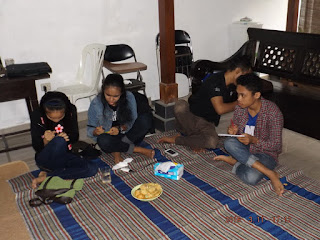 This book review time was opened by Yohanes as the host and continued by Sarloce as the moderator. It began with playing games in which participants wrote seven types of vegetables which are easily planted on narrow grounds. Some participants were able to write up to seven types of vegetables but some others were not.
This book review time was opened by Yohanes as the host and continued by Sarloce as the moderator. It began with playing games in which participants wrote seven types of vegetables which are easily planted on narrow grounds. Some participants were able to write up to seven types of vegetables but some others were not.
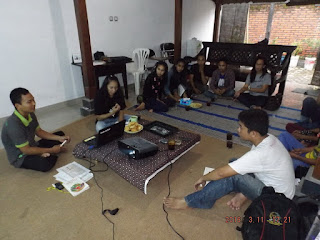 The discussion is interesting because some participants have already attended the session before. Nine participants and five member team of Stube-HEMAT Yogyakarta were able to enliven the discussion. Pascah began the session by explaining the author, publisher, number of pages, reason why he chose the book.
The discussion is interesting because some participants have already attended the session before. Nine participants and five member team of Stube-HEMAT Yogyakarta were able to enliven the discussion. Pascah began the session by explaining the author, publisher, number of pages, reason why he chose the book.
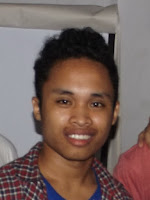
 Discussions getting ‘catchy’ when question and answer session came. Jerry asked what the difference between planting in sand and plain soil was. While Nuel wanted to know the simple way how to measure the acidity of soil or soil pH. Tasya asked about the type of vegetables having high nutrition.
Discussions getting ‘catchy’ when question and answer session came. Jerry asked what the difference between planting in sand and plain soil was. While Nuel wanted to know the simple way how to measure the acidity of soil or soil pH. Tasya asked about the type of vegetables having high nutrition.
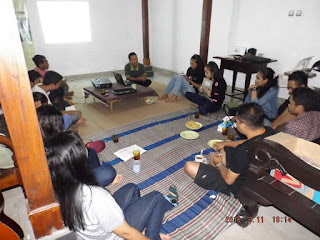 This book review gave a lot of understanding and perspectives toward agriculture. One alternative planting to optimize small area is hydroponics, but the simplest way of planting is using small bags by recycling plastic bottle as pot. Good luck to plant in your narrow garden. (SAP).
This book review gave a lot of understanding and perspectives toward agriculture. One alternative planting to optimize small area is hydroponics, but the simplest way of planting is using small bags by recycling plastic bottle as pot. Good luck to plant in your narrow garden. (SAP).
by adminstube
Farming in Narrow Area
Knowledge and sciences keep improving day by day. The changes from age to age is continuing and prominent, it also happens in agriculture. In rural communities, doing farming is synonymous with vast land in uncultivated land. However, how will the urban communities do when they want to do farming? This is the concern of Pascah Hariyanto as the speaker in book review, held by Stube-HEMAT Yogyakarta on Friday, March 11, 2016, at Limasan. The title of the book is 'Harvesting Vegetable Routinely in A Narrow Yard', written by Cahyo Saparinto and Hesti Dwi Setyaningrum.
 This book review time was opened by Yohanes as the host and continued by Sarloce as the moderator. It began with playing games in which participants wrote seven types of vegetables which are easily planted on narrow grounds. Some participants were able to write up to seven types of vegetables but some others were not.
This book review time was opened by Yohanes as the host and continued by Sarloce as the moderator. It began with playing games in which participants wrote seven types of vegetables which are easily planted on narrow grounds. Some participants were able to write up to seven types of vegetables but some others were not. The discussion is interesting because some participants have already attended the session before. Nine participants and five member team of Stube-HEMAT Yogyakarta were able to enliven the discussion. Pascah began the session by explaining the author, publisher, number of pages, reason why he chose the book.
The discussion is interesting because some participants have already attended the session before. Nine participants and five member team of Stube-HEMAT Yogyakarta were able to enliven the discussion. Pascah began the session by explaining the author, publisher, number of pages, reason why he chose the book.

 Discussions getting ‘catchy’ when question and answer session came. Jerry asked what the difference between planting in sand and plain soil was. While Nuel wanted to know the simple way how to measure the acidity of soil or soil pH. Tasya asked about the type of vegetables having high nutrition.
Discussions getting ‘catchy’ when question and answer session came. Jerry asked what the difference between planting in sand and plain soil was. While Nuel wanted to know the simple way how to measure the acidity of soil or soil pH. Tasya asked about the type of vegetables having high nutrition.Pascah’s explanation of these questions was as follows: First, before planting seeds, dry sand is processed with addition of cow manure, compost and the elements of fertilizer on the topsoil, then, let the soil processed fertilizers and sand. After a while, the field is ready to be planted. Second, a traditional way to measure acidity is by observing whether there are worms in the ground or not. If there are worms in the soil, the acidity of the soil is quite good. Each vegetable contains specific nutrients and each is necessary for our human body.
 This book review gave a lot of understanding and perspectives toward agriculture. One alternative planting to optimize small area is hydroponics, but the simplest way of planting is using small bags by recycling plastic bottle as pot. Good luck to plant in your narrow garden. (SAP).
This book review gave a lot of understanding and perspectives toward agriculture. One alternative planting to optimize small area is hydroponics, but the simplest way of planting is using small bags by recycling plastic bottle as pot. Good luck to plant in your narrow garden. (SAP).Tuesday, 8 March 2016
by adminstube
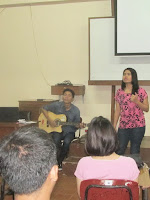 On Monday, March 7, 2016 several students from several universities in Yogyakarta, including STPMD 'APMD', UMBY, STAK Marturia, LPP, UST held a discussion with ‘Talenta’ fellowship, a Christian student community of Mercu Buana University, Yogyakarta. The discussion held as part of regular fellowship was facilitated by Chobas, a student of STPMD 'APMD.' He shared a topic of ‘Justice, from political, social, and religion aspects: What Christian Youth Can Do?’
On Monday, March 7, 2016 several students from several universities in Yogyakarta, including STPMD 'APMD', UMBY, STAK Marturia, LPP, UST held a discussion with ‘Talenta’ fellowship, a Christian student community of Mercu Buana University, Yogyakarta. The discussion held as part of regular fellowship was facilitated by Chobas, a student of STPMD 'APMD.' He shared a topic of ‘Justice, from political, social, and religion aspects: What Christian Youth Can Do?’
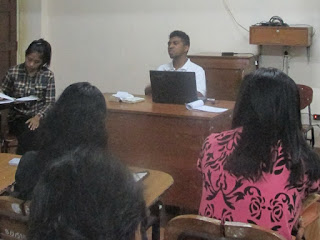 Chobas conveyed Aristotle's theory of justice: commutative justice, distributive justice, natural justice, conventional justice, and justice improvement. He gave many examples for justice with political and social approach, so it was easy for the listener to understand. While verses taken from John 5: 30-31 says: "I can do nothing of myself; I judge according to what I hear, and my judgment is fair, because I did not follow my own free will, but the will of him who sent me. If I testify about myself, my testimony was not true', became a conclusion of justice with religious approach.
Chobas conveyed Aristotle's theory of justice: commutative justice, distributive justice, natural justice, conventional justice, and justice improvement. He gave many examples for justice with political and social approach, so it was easy for the listener to understand. While verses taken from John 5: 30-31 says: "I can do nothing of myself; I judge according to what I hear, and my judgment is fair, because I did not follow my own free will, but the will of him who sent me. If I testify about myself, my testimony was not true', became a conclusion of justice with religious approach.
 Veni, a student of Agro-technology faculty of Mercu Buana asked, "What one must do, if he/she does not know politics, moreover to fight against injustice?" Chobas responded by explaining that politics is universal, everyone has right to take part in politics. However, politics has levels, for example, Ahok and Ahmad Dhani (two figures currently competing for governor in Jakarta). One should learn and go under process to have political capability before entering political world.
Veni, a student of Agro-technology faculty of Mercu Buana asked, "What one must do, if he/she does not know politics, moreover to fight against injustice?" Chobas responded by explaining that politics is universal, everyone has right to take part in politics. However, politics has levels, for example, Ahok and Ahmad Dhani (two figures currently competing for governor in Jakarta). One should learn and go under process to have political capability before entering political world.
by adminstube
Christian Youth:
A Fighter for Justice?
A challenge & call service
Discussing about justice will be never-ending. The issue continues to be a hot topic for debate by many groups. Everyone needs justice both rights and obligations. For the government side, the parameter of program’s success is, whether everyone has obtained equal rights or not. However, the reality shows that it is very difficult to obtain or implement justice.
 On Monday, March 7, 2016 several students from several universities in Yogyakarta, including STPMD 'APMD', UMBY, STAK Marturia, LPP, UST held a discussion with ‘Talenta’ fellowship, a Christian student community of Mercu Buana University, Yogyakarta. The discussion held as part of regular fellowship was facilitated by Chobas, a student of STPMD 'APMD.' He shared a topic of ‘Justice, from political, social, and religion aspects: What Christian Youth Can Do?’
On Monday, March 7, 2016 several students from several universities in Yogyakarta, including STPMD 'APMD', UMBY, STAK Marturia, LPP, UST held a discussion with ‘Talenta’ fellowship, a Christian student community of Mercu Buana University, Yogyakarta. The discussion held as part of regular fellowship was facilitated by Chobas, a student of STPMD 'APMD.' He shared a topic of ‘Justice, from political, social, and religion aspects: What Christian Youth Can Do?’ Chobas conveyed Aristotle's theory of justice: commutative justice, distributive justice, natural justice, conventional justice, and justice improvement. He gave many examples for justice with political and social approach, so it was easy for the listener to understand. While verses taken from John 5: 30-31 says: "I can do nothing of myself; I judge according to what I hear, and my judgment is fair, because I did not follow my own free will, but the will of him who sent me. If I testify about myself, my testimony was not true', became a conclusion of justice with religious approach.
Chobas conveyed Aristotle's theory of justice: commutative justice, distributive justice, natural justice, conventional justice, and justice improvement. He gave many examples for justice with political and social approach, so it was easy for the listener to understand. While verses taken from John 5: 30-31 says: "I can do nothing of myself; I judge according to what I hear, and my judgment is fair, because I did not follow my own free will, but the will of him who sent me. If I testify about myself, my testimony was not true', became a conclusion of justice with religious approach. Veni, a student of Agro-technology faculty of Mercu Buana asked, "What one must do, if he/she does not know politics, moreover to fight against injustice?" Chobas responded by explaining that politics is universal, everyone has right to take part in politics. However, politics has levels, for example, Ahok and Ahmad Dhani (two figures currently competing for governor in Jakarta). One should learn and go under process to have political capability before entering political world.
Veni, a student of Agro-technology faculty of Mercu Buana asked, "What one must do, if he/she does not know politics, moreover to fight against injustice?" Chobas responded by explaining that politics is universal, everyone has right to take part in politics. However, politics has levels, for example, Ahok and Ahmad Dhani (two figures currently competing for governor in Jakarta). One should learn and go under process to have political capability before entering political world.Young people were not always unready, by doing efforts, hard works and having big motivation as the main aspects, they will be able fight against injustice happened in their surroundings with a faith on the Lord Jesus. (ITM)
Thursday, 3 March 2016
by adminstube
 Stube-HEMAT Yogyakarta as an institution to serve students studying in Yogyakarta encouraged the growth of reading and writing habit among students through a forum, namely All about Books and Publishing, presenting Triasmana Wirasta, an editor and practitioners of publication. He was also an alumnus of Stube-HEMAT Yogyakarta. Rasta, commonly called, who has been long working in publishing, provided an overview of the ins and outs of writing and publishing, so that students are motivated and learn to improve their quality of writing even able to publish a book.
Stube-HEMAT Yogyakarta as an institution to serve students studying in Yogyakarta encouraged the growth of reading and writing habit among students through a forum, namely All about Books and Publishing, presenting Triasmana Wirasta, an editor and practitioners of publication. He was also an alumnus of Stube-HEMAT Yogyakarta. Rasta, commonly called, who has been long working in publishing, provided an overview of the ins and outs of writing and publishing, so that students are motivated and learn to improve their quality of writing even able to publish a book.
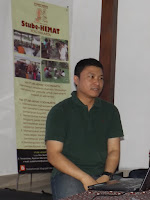 Triasmana Wirasta working at Skripta Media Creative publisher told the ins and outs process of publishing in Indonesia. In Indonesia, the number of publisher reached 1,328 publishers, but in fact the number of publications in Indonesia was very low, according to the data from the National Library, the number of ISBN in 2014 reached 44.327. It meant that the number of publications in Indonesia was still lower than other countries, such as Japan which publish 82.589 and India 90.000 titles in 2013.
Triasmana Wirasta working at Skripta Media Creative publisher told the ins and outs process of publishing in Indonesia. In Indonesia, the number of publisher reached 1,328 publishers, but in fact the number of publications in Indonesia was very low, according to the data from the National Library, the number of ISBN in 2014 reached 44.327. It meant that the number of publications in Indonesia was still lower than other countries, such as Japan which publish 82.589 and India 90.000 titles in 2013.
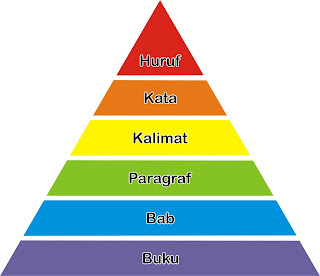 Rasta mentioned criticism of Taufik Ismail, that the current generation was 'myopic in reading and paralyzed in writing.’ He explained that reading interest is still low because the culture of reading has not been realized yet among the community. In addition, it was also influenced by a lack of qualified reading text. While the low of interest in writing was influenced by the writing culture, low knowledge on procedure of writing and publishing and wrong assumption about the world of writing and publishing. Actually, the author reputation is worth only 10% (comparison in the table), it means that, the beginners get opportunity to publish a book! Note: (grading standard in publishing: editorial 10%, prospect of market 50%, content 30%, reputation of the author 10%).
Rasta mentioned criticism of Taufik Ismail, that the current generation was 'myopic in reading and paralyzed in writing.’ He explained that reading interest is still low because the culture of reading has not been realized yet among the community. In addition, it was also influenced by a lack of qualified reading text. While the low of interest in writing was influenced by the writing culture, low knowledge on procedure of writing and publishing and wrong assumption about the world of writing and publishing. Actually, the author reputation is worth only 10% (comparison in the table), it means that, the beginners get opportunity to publish a book! Note: (grading standard in publishing: editorial 10%, prospect of market 50%, content 30%, reputation of the author 10%).
by adminstube
All About Books
and Publishing
Omah Limasan, Wednesday, March 2, 2016
Books are easily found around us. Since our childhood we always meet books, from a form of textbooks or lectures, novels, magazines, dictionaries, encyclopedias, holy bible, comics and other forms. The existence of books and their benefits should be balanced with the interest in reading and writing. Moreover for students, the intellectual life of student is shown by his/her habit of reading and writing.
 Stube-HEMAT Yogyakarta as an institution to serve students studying in Yogyakarta encouraged the growth of reading and writing habit among students through a forum, namely All about Books and Publishing, presenting Triasmana Wirasta, an editor and practitioners of publication. He was also an alumnus of Stube-HEMAT Yogyakarta. Rasta, commonly called, who has been long working in publishing, provided an overview of the ins and outs of writing and publishing, so that students are motivated and learn to improve their quality of writing even able to publish a book.
Stube-HEMAT Yogyakarta as an institution to serve students studying in Yogyakarta encouraged the growth of reading and writing habit among students through a forum, namely All about Books and Publishing, presenting Triasmana Wirasta, an editor and practitioners of publication. He was also an alumnus of Stube-HEMAT Yogyakarta. Rasta, commonly called, who has been long working in publishing, provided an overview of the ins and outs of writing and publishing, so that students are motivated and learn to improve their quality of writing even able to publish a book.
The forum was held at Omah Limasan on Wednesday, March 2, 2016 hosted by Trustha Rembaka, S.Th., the coordinator of Stube-HEMAT Yogyakarta and attended by more than twenty participants. It began with introduction and an ice breaker game of jumbled cards that contain step by step on how to publish a book. Each participant was also invited to 'dream' about what will he/she write.
 Triasmana Wirasta working at Skripta Media Creative publisher told the ins and outs process of publishing in Indonesia. In Indonesia, the number of publisher reached 1,328 publishers, but in fact the number of publications in Indonesia was very low, according to the data from the National Library, the number of ISBN in 2014 reached 44.327. It meant that the number of publications in Indonesia was still lower than other countries, such as Japan which publish 82.589 and India 90.000 titles in 2013.
Triasmana Wirasta working at Skripta Media Creative publisher told the ins and outs process of publishing in Indonesia. In Indonesia, the number of publisher reached 1,328 publishers, but in fact the number of publications in Indonesia was very low, according to the data from the National Library, the number of ISBN in 2014 reached 44.327. It meant that the number of publications in Indonesia was still lower than other countries, such as Japan which publish 82.589 and India 90.000 titles in 2013.
 Rasta mentioned criticism of Taufik Ismail, that the current generation was 'myopic in reading and paralyzed in writing.’ He explained that reading interest is still low because the culture of reading has not been realized yet among the community. In addition, it was also influenced by a lack of qualified reading text. While the low of interest in writing was influenced by the writing culture, low knowledge on procedure of writing and publishing and wrong assumption about the world of writing and publishing. Actually, the author reputation is worth only 10% (comparison in the table), it means that, the beginners get opportunity to publish a book! Note: (grading standard in publishing: editorial 10%, prospect of market 50%, content 30%, reputation of the author 10%).
Rasta mentioned criticism of Taufik Ismail, that the current generation was 'myopic in reading and paralyzed in writing.’ He explained that reading interest is still low because the culture of reading has not been realized yet among the community. In addition, it was also influenced by a lack of qualified reading text. While the low of interest in writing was influenced by the writing culture, low knowledge on procedure of writing and publishing and wrong assumption about the world of writing and publishing. Actually, the author reputation is worth only 10% (comparison in the table), it means that, the beginners get opportunity to publish a book! Note: (grading standard in publishing: editorial 10%, prospect of market 50%, content 30%, reputation of the author 10%).
Rasta’s simple and clear explanation was able to attract participants’ attention. Since the beginning they followed the session enthusiastically and full of curiosity, even it encouraged participants to start writing their experiences. ‘Let’s write a book! Because a book will encourage us to dare dreaming, to arouse energy and spirit and enable us and the readers to do something. So, from now, not be afraid to write!’ he concluded and ended the session. (TRU).
Wednesday, 2 March 2016
by adminstube
by adminstube
EXPLORING SUMBA
DESCRIPTION
A program of Stube-HEMAT Yogyakarta which sends students, activists of Stube-HEMAT Yogyakarta to Sumba. They will share their knowledge and skills to students and young people in Sumba
ACTIVITIES CONDUCTED
Doing interaction with students (discussing actual topics)
Giving help in learning to build and manage networks
Share knowledge and skills that can be applied in Sumba
REQUIREMENTS FOR PARTICIPANTS
active participant of Stube-HEMAT Yogyakarta
Come from other than Sumba
Propose application and presentation
Following the debriefing session
Statement of commitment
EXTRA
Available for 6 paticipants in 2016
In Sumba is approximately 30 days
Further information please contact:
Trustha Rembaka, S.Th (081392772211)
or visit
Stube-HEMAT Yogyakarta
Jln. Tamansiswa, Nyutran MG II / 1565 C,
Yogyakarta
Web Archive
2024 (6) 2013 (20)
2012 (12)
2011 (2)
2010 (18)
Total: 449




